Jackals' Revenge Read online
IAIN GALE
Jackals’ Revenge
Dedication
To Patrick Barty
and
the people of Crete
Table of Contents
Cover
Title Page
Dedication
Chapter 1
Chapter 2
Chapter 3
Chapter 4
Chapter 5
Chapter 6
Chapter 7
Chapter 8
Chapter 9
Chapter 10
Chapter 11
Chapter 12
Chapter 13
Chapter 14
Chapter 15
Chapter 16
Chapter 17
Chapter 18
Chapter 19
Historical Note
By the same author
Copyright
About the Publisher
1
Dawn rose over the pass of Thermopylae as it had since the beginning of time. As it had on that day 2,000 years ago, when Leonidas’ Spartans had died to the last man holding this great natural strongpoint against the invading Persian hordes. This morning, though, something was different, for with the dawn came a new sound on the air, drowning out the bees and the birdsong and shattering the peace of an Attic morning. It was a high-pitched whine, descending earthwards out of the sky. The sound of modern war. The clarion call of a new and terrible barbarism which had laid claim to the civilised world.
Captain Peter Lamb heard the sound and looked up in alarm. He knew it only too well. Had become familiar with it in the fields and on the roads of France less than a year ago, and it made his blood run cold. Without a second glance he yelled across the pass to where his men were sitting pulling through their guns. They had been on stand-to all night, waiting for the German attack that was sure to come. Their faces were drawn with exhaustion, but for all their fatigue they had already heard the sound. The younger men, the new recruits and replacements, were still looking skywards, not certain what they heard, although it was not new to them. The old hands, though, were already on their feet as the words left Lamb’s lips.
‘Stukas. Take cover.’
The first bombs fell seconds later as the whine of the sirens fixed beneath the wings of the hated aircraft reached its crescendo. The men cowered in their funk holes and in any space they could find in the unforgiving rocky landscape, their hands over their ears and their tin hats, their mouths open to lessen the shock of the blast, their bodies tucked up into tight balls. As the bombs hit, their hammer-blow explosions dug deep into the baked white rock, sending lethal shards in all directions, and the men, even though they had not been hit, mouthed their oaths. They shut their eyes tight and two of the younger ones tried to push themselves into gaps in the rocks.
Tucked into his own tiny slit-trench, Company Sergeant-Major Jim Bennett saw them and ran across to them at a crouch, before speaking through the din, hard into their faces. ‘Now then, Dawlish, Carter, you don’t want the captain to see you hiding like that, do you?’
‘No, Sergeant-Major.’
‘No, Sergeant-Major. I should bloody well think not. Now bloody well brace yourselves and look like soldiers. They’ll be gone soon enough.’
Bennett swore quietly. It was bravado, of course. But sometimes, he thought, keeping up morale was more like being a wet-nurse. He thought of the old platoon, of the men they had left behind in the fields of France last year and the few they had led out and who were still with them, and he wished for the impossible. Bennett knew they would just have to make do with what they had. But he had confidence in Lamb. If any officer could lick them into shape he knew it would be his. Hadn’t most of them already come through Egypt together? He knew that some of them at least had the makings of good soldiers. Still, though, he longed for his fallen friends and prayed that these new lads would prove themselves capable of avenging them.
Bennett had been right about the raid. Within minutes it was over. Two bombs each, and that was it for the six-plane squadron. The dive-bombers veered away like hawks up into the azure sky and the men crawled out from their holes into the dusty air of the balmy April morning, coughing and cursing.
Lamb and his men, C Company, the North Kents, or the Black Jackals as they were known to the army, had been given simple orders. ‘Hold the pass. Do not allow the enemy through.’
His CO, Colonel George de Russet, had made it plain enough to them at the last Order Group. ‘Gentlemen, here we are and here we bloody well stay.’
Lamb knew that the Stukas had only been a taster and prepared himself for what he knew was to come. This would be as hard a battle as he had yet fought, and perhaps his last.
He shouted across to Bennett: ‘Sarnt-Major. Any casualties?’
‘Two, sir. One’s a goner. Spencer.’
Poor bugger, thought Lamb. He’s the first then. How many more today? He turned towards the young lieutenant in command of Number 1 platoon, Charles Eadie. ‘Charles, see if you can make those slit-trenches any deeper. This rock’s bloody stuff but we’ll have to do better than that before their big guns open up or we’ll all be goners.’
As the lieutenant scuttled away across the rocks, Lamb considered their position. He had led eighty men into Greece just under a month ago. Now he commanded something over half that number. They were still in their three platoons and of the three junior officers he had lost only one, the young lieutenant of Number 3 platoon, who had been replaced with a transfer from Battalion HQ. There were now forty-eight men plus himself. And, whatever their orders, whatever position they were told to hold, it was now his ultimate task to get them away and back to Alexandria. Two days ago the Greeks had surrendered, and now the British and Commonwealth troops who had been sent to defend them were on their own.
Lamb’s immediate orders were to cover the withdrawal of the New Zealand 6th Division. So now here they sat, the Jackals, in the pass of Thermopylae. The bloody rearguard. Again.
The Greek campaign had been a hard schooling, and of the casualties in his company two were now in hospital in Athens with nervous exhaustion, their minds as shattered as the bodies of those who had died. In a previous war – his father’s war – they would have been shot as cowards. Now Lamb thanked God, at least they were only labelled insane. It did not surprise him. Although they had seen action in Egypt, they had only caught the last of the fighting in Cyrenaica before the Italian surrender in February. Greece had been very different. They had seen and felt the full might of the German war machine. Worst of all, the Germans held the skies. There seemed to be no end of their planes. Surely they would just bomb Greece into submission?
Eadie was back with him now. ‘I’ve got all the platoon sergeants on the case, sir. I’ve told them to get the men to dig down another foot.’
‘They’ll be lucky if they manage six inches.’
Charles Eadie was a curious-looking man, with a large head sitting on huge, broad shoulders and a naturally nut-brown complexion which suggested that at some point one of his ancestors might have been born the wrong side of the counterpane, as his mother would have put it. His movements too seemed awkward, but strangely he managed to be quite dexterous and was always perfectly turned out, even now in this dustbowl. His green eyes shone like emeralds from the dark skin and as usual he was wearing a smile, but it did not disguise his nervousness.
After a few moments he spoke. ‘We can’t really hold them here, sir, can we?’
‘No, Charles. I don’t think we can. But we can try, can’t we?’
There was a pause. ‘D’you think we’ll make it out of here, sir?’
‘I would say we had a fighting chance. Wouldn’t you?’
‘Of course, sir. We’re the Jackals, after al
l. And it’s a pretty good position.’
‘Yes, pretty good.’ Lamb smiled. ‘Although it didn’t do the Spartans much good.’
‘Sir?’
‘Thermopylae, Eadie. Where are your Classics?’
‘Oh, I wasn’t very good at Classics, sir. I was more of a mathematician at school. But I do know that there was a battle here before. In history.’
Lamb nodded. ‘And we, Charles, are standing in the footsteps of heroes.’
The man who had been standing to their right, a sergeant, now spoke and Lamb realised unsettlingly that he had been there all the time. He had a curious accent, clipped and cultured, yet somehow not of the establishment, as if behind everything he said there might be an element of sarcasm. ‘Actually, sir, there have been six battles here. The Spartans, of course, the famous one against the Persians in 480 bc, but then there was another in 353 bc, one in 279 bc when the Gauls attacked, then the Romans came here in 190 bc, and then they themselves were attacked by the German tribes in ad 267, and then of course there was the Greek revolution in 1821. Byron and all that.’
Lamb shook his head. ‘Is there any end to your knowledge, Valentine?’
The sergeant shrugged. ‘Couldn’t say, sir. I was just praying that we’d get out of here alive. And that we aren’t captured.’
‘I share your sentiments.’
‘But I really do mean it, sir. You know that when the Greek revolutionary hero Diakos was captured here by the Turks in 1821 they impaled him and roasted him alive on a spit.’
Eadie blanched. Lamb laughed. ‘Valentine, I hardly think that the Germans will do that if they capture us, do you?’
Valentine shrugged and smiled. ‘Who knows, sir. Anything can happen in this war. Permission to brew up, sir.’
Lamb nodded, and as Valentine wandered off he shook his head and wondered to what god or gods that conundrum of a man had been making his prayers.
They had been through France together, and Valentine had saved Lamb’s life. Twice. They had come through the chaos of the Dunkirk retreat and had made it back home. But they had also witnessed atrocities in France and he knew that similar massacres were already happening in Greece. But roasted alive? He hardly thought so. Not even the Nazis.
Lamb sat on a rock, took the map from his pocket and wiped the sweat off his forehead. Above him on a high rock a goat moved, loosening stones and jangling up the hill pursued by a small boy who was shouting something in Greek. Life goes on, he thought. For a while at least. He wondered what lay in store for the Greeks once they too had fallen under the Nazi boot. The same fate as France? Stories had come out that in that country where he had fought so recently the population was being systematically brutalised.
He had brought out a French girl, Madeleine, and he thanked God that he had. They had become very close. Lovers. But he had left her back in London when the battalion had shipped out to Egypt with 1st Armoured Brigade in January and he wondered how far she had got with her efforts to join the Free French army that had formed in London under de Gaulle. He had no love for the man, not after what had happened to the Highlanders temporarily under his command on the Somme last year. But they said that his presence now as the leader of the Free French in London had given his countrymen fresh hope, and that, Lamb knew, was what really mattered.
He was not sure, though, what hope there was for him and Madeleine. Although he had written to her several times, he had received only one letter from her since Egypt and that of course had been censored. He wondered if he would ever see her again. It seemed to him at this moment that he would either die here or be taken prisoner and he wondered how long the war might last. Hitler must be stopped, of course. But now Britain stood entirely alone against the might of the Nazis.
He looked over at his men as they recovered from the air attack, lighting up cigarettes and making tea. They were new faces, most of them, and a precious few of the die-hards of his old platoon that he had brought out of France. Apart from Valentine and Bennett there was Private Smart, his batman and the newly promoted signals operator at Company HQ. He watched as Corporal Mays, now made up to sergeant of Number 2 platoon, cadged a Woodbine from one of the new intake, and looked across at the group of Butterworth, Hughes, Perkins and Wilkinson, corporals now, all of them. Stubbs, the heavy weapons expert, was a corporal too and had been given command of the company mortars. And Private Hale, who had been wounded at the Dyle and whom they had all given up for dead or captured, had miraculously appeared again at the depot at Tonbridge and now he too had a stripe.
Lamb counted himself particularly lucky to have managed to hold on to Jim Bennett. The army had wanted the tough cockney sergeant as a drill instructor for officer training. But Lamb had insisted and, although the Sergeant-Major didn’t know it, he had made it a condition of accepting his own promotion to captain and the company that went with it that Bennett should stay with him. A little string-pulling had done it. But then what were connections for, if not for that? He and Bennett knew each other in the way that only a junior officer and his sergeant can. They were a close team, each reading the other’s thoughts at any crucial moment. He could not afford to lose him. And he knew too that while Bennett might be one of the bravest men he had ever met, at present his mind was filled with more than the battle that lay ahead. Bennett had left a young wife back at home in London and she was due to give birth in seven weeks. And they had all heard what was happening to London. He cursed the Luftwaffe and reminded himself to keep a close watch on the Sergeant-Major.
The power of his connections in the higher echelons of the army had taken Lamb a little by surprise. He knew that he had managed to turn a few heads on the Staff and raise a few eyebrows with his unorthodox behaviour in France. But his promotion had been faster than he might have supposed. It had been suggested to him that he might be interested in joining a new unit, as yet unnamed, that was forming in Scotland. Some sort of elite force drawn from various regiments. Lamb had refused. He was an infantry officer, as loyal to his regiment as he was to King and country. He loved the Jackals. They were his home. And he wasn’t sure either about his exact views on an ‘elite unit’.
He also wondered whether the regiment hadn’t been chosen for the Greek expeditionary force on account of his belonging to it. Lamb had glimpsed the signature on the battalion’s movement order and recognised it as that of a certain colonel on the staff whom he knew to be keeping an eye on him. The same man had earlier suggested joining the new unit. The posting had certainly puzzled the battalion CO. ‘Greece? Us? With the tanks?’ de Russet had said. ‘Good grief! Flattered, of course. Honoured. The Jackals are always spoiling for a fight.’
He was wondering how long the war might last, when Britain might defeat Germany, when around the edge of the gully came a British major wearing red tabs on his collar. He was escorted by two armed riflemen.
The staff officer saw Lamb and smiled. ‘You the Jackals?’
‘Yes. The rearguard. C Company. Captain Lamb.’
‘Well, you’re to fall back. The rest of your battalion’s doing the same. Making for the Peloponnese. We’re all pulling out. Your battalion transports are in a field to the west of the village. Take the Brallos pass. Head south. You’d better be quick about it, Jerry’s almost here.’
‘Sorry, sir. I was told we were holding the pass.’
‘Well, you’re not holding it any more, Captain, are you? We’re leaving it to the Anzacs. This is their party now.’ He frowned. ‘You don’t actually mean you want to stay?’
Lamb shrugged. ‘Well, I want to do what’s right, sir. At least we’ll do what we’re ordered to, sir. I thought we might hold them up for a few hours.’
‘Or get blown to pieces in the process, Captain. Come on. Ten minutes. That’s all.’ And with that he was gone.
Lamb turned to Bennett. ‘I don’t believe it, Sarnt-Major. Do you?’
‘Just like in France, sir, if you ask me. No one knows what the blazes is going on. Not ours to question
, though, sir. Eh? We’ll leave it to the Kiwis.’
‘Yes, you’re right, Bennett. It’s just that I can’t help feeling as if we’ve been given a last-minute reprieve. And desperately sorry for those poor bastards in the pass.’
Bennett was right, he thought. It was just like France. There too they had been told to pull out after having first been ordered to hold on. There, though, Lamb had disobeyed the order and it had damn near killed him. The wound in his back still gave him the occasional pain. This time he would do as he was told. This was no time for heroics. Not yet. He wondered, though, when the army would really stop retreating. They had won a victory in Egypt against the Italians, but it seemed that wherever they met the Germans in battle it was the British who did the running. They looked down into the pass towards where the New Zealanders had their forward positions.
‘They’re damn good fighters, sir. They’ll hold Jerry up for a while.’
Lamb nodded his head. ‘Yes, Sarnt-Major. I’m sure they will. We’d better get moving if we’re going. Get the chaps together, will you. We’ve only got ten minutes.’
There was a whine from north of the pass followed by a huge explosion.
Lamb stared at the rising cloud of dust. ‘Christ, those are 88s. Come on.’
The promised transports laid on for their withdrawal were a motley collection. According to the major, the Battalion HQ, along with A and B Companies, had gone on ahead, leaving Lamb with the last pickings. They amounted to two 3-ton trucks, a Bren carrier and a couple of fuel bowsers. Somehow, though, they managed to cram themselves in with all their equipment, and at last, with more rounds from the German anti-tank guns crashing into the emplacements behind them around the pass, they set off south west. Lamb took the lone carrier in front, and led the way along the road away from Thermopylae.

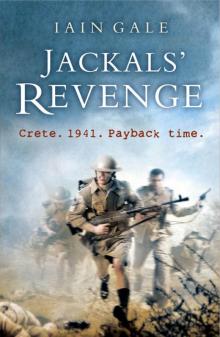 Jackals' Revenge
Jackals' Revenge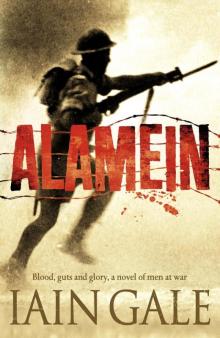 Alamein
Alamein Conspiracy
Conspiracy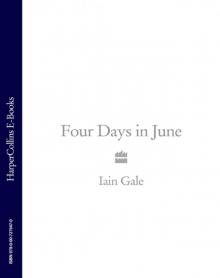 Four Days in June
Four Days in June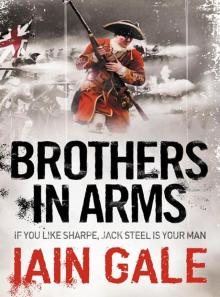 Brothers in Arms (Jack Steel 3)
Brothers in Arms (Jack Steel 3) Brothers in Arms
Brothers in Arms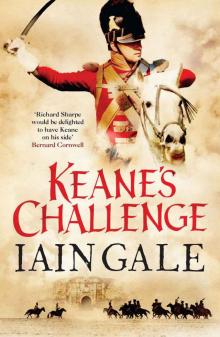 02 - Keane's Challenge
02 - Keane's Challenge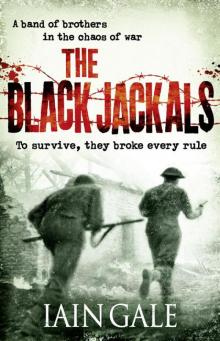 The Black Jackals
The Black Jackals Man of Honour
Man of Honour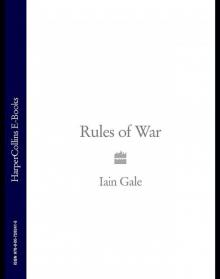 Rules of War
Rules of War